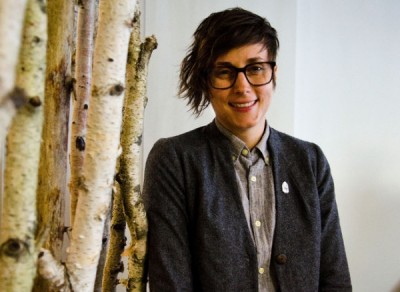by Amy Richardson, CFICE Communications RA
The Community Environmental Sustainability (CES) hub at Community First: Impacts of Community Engagement (CFICE) works towards facilitating community-campus partnerships to increase environmental sustainability. The CES hub functions at the local level in three key communities across Ontario: Ottawa, Peterborough and Haliburton.
Brianna Salmon, newly appointed executive director at GreenUP, helps facilitate those partnerships to increase environmental sustainability in Peterborough, Ont.
Previously GreenUP’s manager of the transportation department, Brianna says she was drawn to GreenUP because of its commitment to environmental sustainability.
“The work that GreenUP and organizations like GreenUP do is really vital, both in terms of direct program implementation and partner facilitation, but also being an advocacy voice for progressive policies and plans within all levels of government,” she says.
That’s what drew her to this kind of work and she says it’s been hugely humbling.
“I was interested in finding an organization where I could engage in really grounded, vocal work and I think that’s been something’s that’s felt very meaningful to me.”
CFICE and GreenUP partner with Trent Community Research Centre and Trent University to facilitate community-campus partnerships, allowing students and academics the opportunity to partner with the community and work together towards environmental sustainability.

Brianna Salmon is GreenUP’s Executive Director and a community partner with the CES hub. ©the Peterborough Examiner
“As an organization, we welcome hundreds of students to projects but it can often be challenging for us as an organization to manage. We have limited capacity and a lot of our programs and staff are grant funded so they have specific restrictions and things they should be focusing on,” she says. “We recognize it’s very valuable but often facilitating student research isn’t one of those things.”
Brianna says she was drawn to the CFICE project to help facilitate those partnership opportunities.
“I was really interested in looking at how we can support the capacity of community partners, like us, in actually engaging in student research.”
Brianna says GreenUP’s partnership with CFICE has been very meaningful.
“CFICE has meant to me and my organization the opportunity to engage really deliberately and in a way that is more transparent with our academic partners to make sure that our partnerships are as sustainable and impactful as possible,” she says.
But measuring that impact can sometimes be hard due to lack of funding for evaluation.
“Doing a robust evaluation program is something you don’t often get funded for in the non-profit sector and it can be a bit of a gap from my perspective,” she says.
“Often what tends to happen is that we move from project to project really not being able to do much meaningful evaluation.”
Without evaluation, Brianna says, it’s hard to understand what the long-term impact is of GreenUP’s community interventions.
“That was one of the reasons we were really interested in engaging in the CFICE project – to really try and increase our capacity to reflect critically on the kinds of activities that we undertake. Also making sure that we are being able to address some of the environmental challenges that GreenUP seeks to program around in a way that’s really strategic and thoughtful,” she says.
The partnerships are important to get everyone working towards the common goal of environmental sustainability.
“Making sure that the health of our environment remains a priority is everybody’s responsibility,” Brianna says.
“Our livelihoods and human health are contingent upon it.”